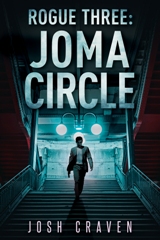Novel First Draft Complete
First, a big thank you to those who have read Dreamland. I am very happy to have a handful of reviews for it on Amazon. If you read it and liked it, please consider adding a review.
In other news, I recently finished the first draft of a novel. To quote Lester Burnham, “I rule.”
The basic idea for the novel has been jangling around in my head for a few years (an early file of notes is dated July 2013), but the novel was written in its entirety between February 15 and May 15, 2017. It currently tips the scale at about 82,500 words. I’ll share some of my experiences here for anyone interested in writing a novel or who is currently in the boxing ring going toe-to-toe with such a beast.
I say the novel was written between mid-February and May 15, but at the end of February, I had only about 6,600 words down. I wrote the remaining 76,000 words over the next 76 days (I just realized that coincidence; it certainly was not intended).
If you are having trouble getting started writing a novel, know that you are not alone (as if an internet search wouldn’t confirm as much). I found it very difficult in the early going—something akin to digging a large artifact out of deep, shifting sand in the pit of dark cavern—despite having the general plot in mind for about three years. Hence, the 6,600 words in February.
Let’s be clear on something: writing is a mental exercise. I know that sounds obvious, but just step back and appreciate that for a moment. It is literally all in your head. The key is working around your brain’s natural inclination to jam you up. Get your mind working for you, not against you. Think: Head Games by Foreigner- the lyrics were almost certainly created with novel writing in mind. Look ’em up.
I’m going to stick with the adventurous-archaeologist-digging-up-an-artifact imagery for a bit. I hope that’s ok; I promise not to over-do it.
I found it didn’t matter how much I ruminated over the story concept. When I actually started writing, it was like being down in the cavern, digging into sand with bare hands and no flashlight, searching for something that I had only heard whispered about in the dark, smoky corner-booth of my mind. That big artifact was down there, wanting to be uncovered, and I was exhuming it extremely slowly. So slowly, in fact, I realized pretty quickly I wasn’t making progress at a satisfactory pace. Not even close.
Prior to the novel, I wrote short fiction—short stories up to novelette length, like Dreamland. I have always liked the length of short stories, both for reading as well as writing. “Shorts” fit my attention span (I’m probably ADD, but I attended small, rural schools many years ago, and ADD didn’t exist there. To the extent it did, it was treated with a board in the principal’s office), and “shorts” fit with having a full-time job. When I started writing the novel, I found I wrote like I was used to—in fits and starts, bursts and dry spells. I’d dig like a mad man, then I’d be wiped out for a while.
So I broke from the novel. I exited the cavern and went topside, determined to find a light, a shovel, any tool that would help me.
I read through several helpful websites, but none grabbed me by my ADD lapels until I got to this one: http://storyfix.com. Larry Brooks has a lot of helpful information in bite-sized chunks on his website. Much of it is free, some of it is not. Make your own call on that; to each his own. Apparently there are a few people that have a hang-up over whether his approach is a creativity-killing “formula,” but, personally, I couldn’t care less how you label it. While others were fretting over this question, I wrote a novel, and his website was a very helpful tool to getting my artifact unearthed. For what it’s worth, his advice on structure certainly didn’t create any of my characters or settings or story ideas. As someone who had never written a novel, it did help me understand one approach to digging to the bottom of the hole.
I also set up a spreadsheet to log my daily word count, as well as my running-total word count. This provided me with a daily accountability device. At the end of each day, I had to enter a number. Entering a zero was a personal embarrassment; entering 2,000 or more made me feel like Hemingway. Most days I was somewhere in between. I even made a bar graph. Silly, I suppose, but it helped me visualize my progress.
I know some professional writers knock out 2,000 words daily, religiously, but I didn’t do that. After some hardcore planning and outlining (I had always written short stories from my head, or by the seat of my pants), I went back to work. In March, I wrote about 24,500 words. I wasn’t breaking any records there, but I was doing two very important things: 1) I was making significant progress on my novel, and 2) I was conditioning myself to better writing habits.
In April, I wrote about 34,500 words. That’s a 10,000 word jump from the prior month. My pace was improving in May, when I wrote the last 16,000 words, but the sample is small as I “finished” then spent a few days going back and addressing some issues I had flagged along the way.
As I wrote, I wanted to get the story down, out of my head, so I wrote fast and with little regard for “making it perfect.” Look up Dean Koontz’s approach and imagine the exact opposite. That was me. However, I did recognize I was writing some things that were not 100% consistent with earlier parts of the books, so I made a running list below a line at the bottom of the manuscript. Anything I needed to fix, I made a note of (e.g. 1. Tom’s car was red in chapter 1, made it black in chapter 7 because needed it to blend in with the motorcade—FIX THIS). That one is fake, but some were about that easy; others were much more in depth. The last week or so, I was going back and cleaning up these issues.
The story changed as I wrote it. Not completely—it’s still the same basic story I planned to write, but some key plot points were altered as needed. Also, I found the last half of the book difficult to outline in advance, and the last quarter of the book almost impossible, except for the climax and resolution, though I tried as best I could. Much of this was filled in as I progressed and more of the artifact came into sight.
Now that the first draft is finished, it’ll sit for about three months. In August, I’ll dust it off and start revising, making it better. Cleaning up the artifact. Until I revise it, I can’t tell anyone anything, and that’s the hardest part. Now that I’ve unearthed this exciting find, I want to share it with my friends and family, and waiting until it’s actually presentable takes an amazing amount of self-discipline.
So, I’ll stay busy until it leaves the front of my mind. I have a recent short story that needs revision after writers’ group feedback. I have a collection of some of my stories that I’m editing for publication very soon, and I have several story ideas I cannot wait to start writing.
Including the sequel to Dreamland 😉
Dreamland on Amazon
You May Also Like

JOMA Circle novel coming later this month
January 7, 2020